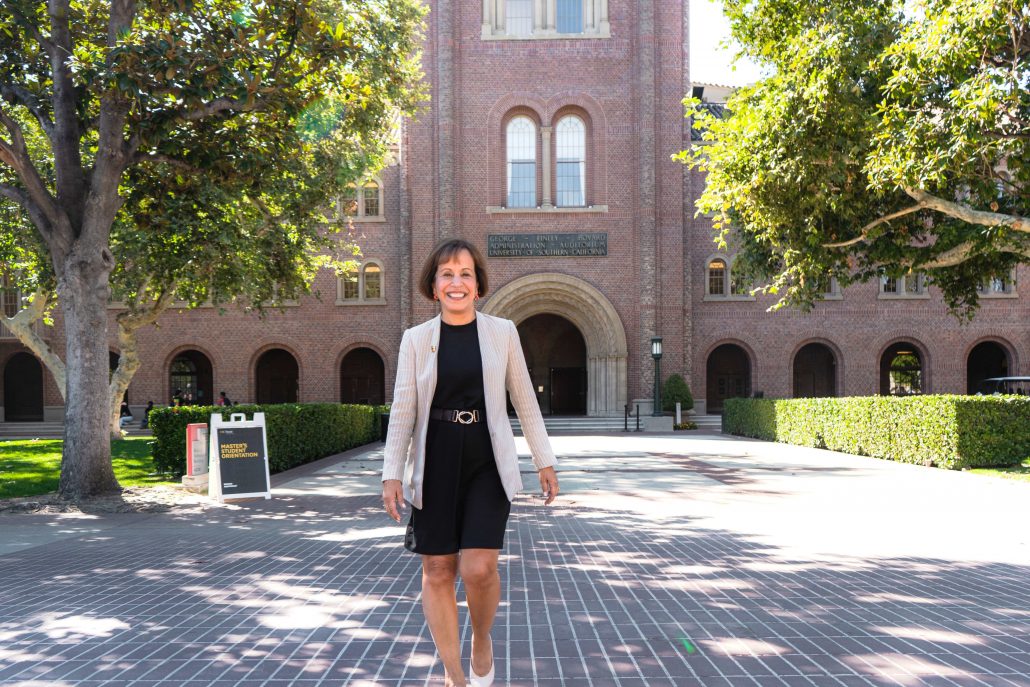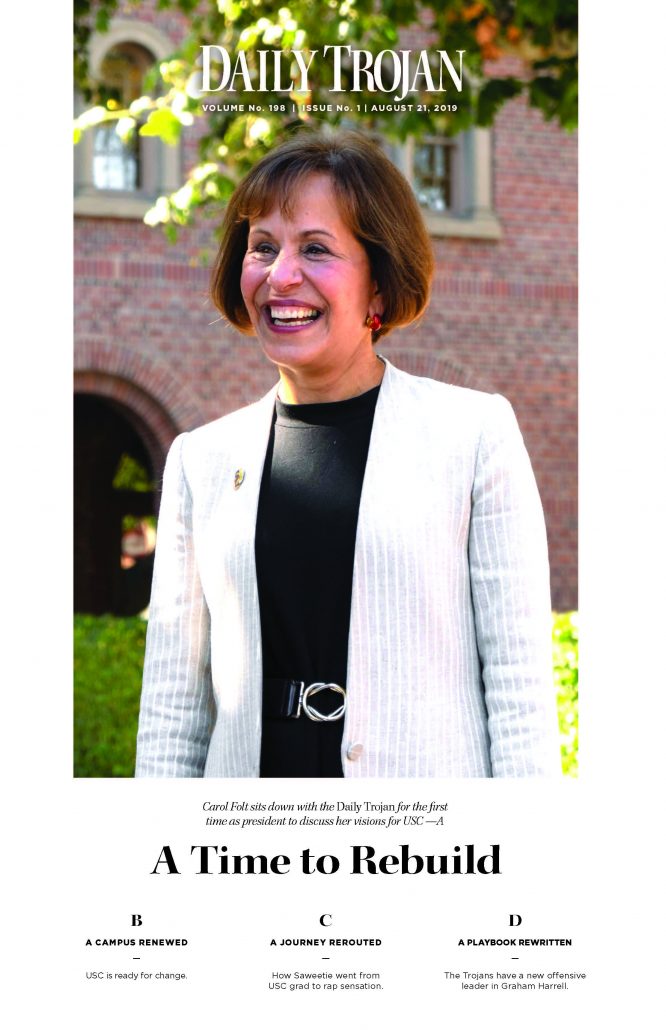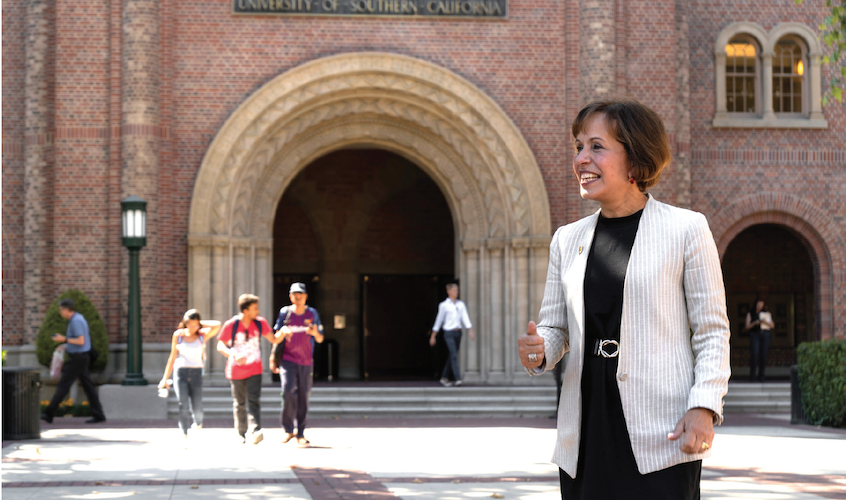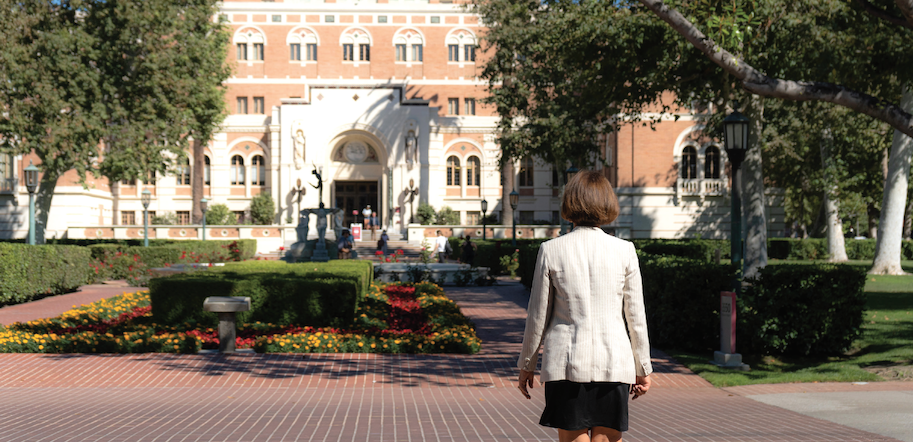Turning the page: Carol Folt promises a student-driven presidency

When Dr. Carol Folt sits at her desk in the Bovard Administration Building, she has an unobstructed view of Alumni Park — she can see every student who walks, bikes or skates past. Unlike Bovard’s recognizable brick walls that tower over campus, Folt seems grounded in her first-floor office, a space complete with tall, white walls and nearly floor-to-ceiling windows.
The shelves in her office sit empty, though Folt’s daily schedule as she transitions into her new role as USC’s 12th president is anything but. From meeting with deans and campus custodians to speaking with student leaders and the Board of Trustees, Folt has made it her goal to meet members of the Trojan community from every corner of campus.
Folt officially assumed the presidency July 1, just one of a few milestones that have marked her transformative summer.
The new title of president is impressive, but Folt now bears a more personal one too: She’s become a grandmother. Her daughter, Tessa, welcomed her first child earlier this summer.
“She’s got to be dressed as a little Trojan when she comes here for the inauguration,” Folt said excitedly.
THE LEADER
While her first few months in office were flush with new beginnings, they were also paradoxically marked by familiarity. Folt has spent time researching and learning about campus culture and tradition, but she is no stranger to leading a major university through times of crisis.
Her career path is characterized by historic firsts — after serving as provost and interim president at Dartmouth College, Folt was named the first woman chancellor at the University of North Carolina, Chapel Hill in 2013. She made history again when she was named USC’s first permanent woman president in its 139-year history.

It comes as no surprise that her decorated career played a role in her unanimous vote-in by the Board of Trustees, but her experience dealing with national scrutiny and campus controversies are what makes her most qualified to inherit a University that would especially benefit from her fortitude.
When Folt took over as chancellor of North Carolina’s flagship university, the circumstances weren’t dissimilar to those she faces now. UNC had just seen an extensive 18-year academic scheme that allowed student athletes to take fraudulent “paper classes” in which students rarely met in person and professors inflated grades. Under Folt, the university faced public outrage, sanctions from the NCAA and an independent investigation from federal prosecutors.
In January, UNC’s Board of Governors asked Folt to resign, months earlier than she had planned. The action came days after Folt’s decision to remove the pedestal where “Silent Sam,” a campus Confederate statue, once stood. The statue caused turmoil at UNC last fall, with students protesting and ultimately taking down the statue themselves.
While some applauded Folt for her boldness, many thought her decision came far too late.
In a March 2019 editorial from the Daily Tar Heel, UNC’s student newspaper, the editorial board described “major issues with her and her administration’s lack of transparency,” during the Silent Sam controversy and her handling of the NCAA scandal. However, the editorial also encouraged USC to remain optimistic that her six years at UNC taught her some valuable lessons.
Equipped with this experience, Folt takes the seat of presidency during one of the most trying times in USC’s history. In the past three years, the University has found itself in the national spotlight several times, as it faced controversy after controversy.
In 2017, former Keck School of Medicine Dean Carmen Puliafito was found to have used illicit drugs while seeing patients. Since 2018, over 700 women have accused former campus gynecologist George Tyndall of sexual abuse. And earlier this year, an FBI investigation revealed that wealthy parents bribed athletic officials at several high-tier universities, including USC, to admit their children using fake athletic profiles. Also this year, nearly 50 students and alumni claimed they were abused by former campus men’s sexual health doctor Dennis Kelly.
Along with the myriad missteps that plague the University, the halls of Bovard saw many faces in the past few years. After former president C. L. Max Nikias’ resignation in 2018, Wanda Austin assumed the interim presidency. Provost Michael Quick, Vice President of Student Affairs Ainsley Carry and Senior Vice President of Legal Affairs Carol Mauch Amir all stepped down in the past semester.
And yet, Folt’s grand office in Bovard seems free from any reminders of the University’s turbulent past and uncertain present. Bright light pours into the room, giving the space an airy, open glow. The light seemed to match Folt’s attitude in her new role — her readiness to roll up her sleeves, remain honest and transparent and begin the work that needs to be done to start a fresh chapter for the University.
THE EDUCATOR
Though Folt is the first woman president at USC, she views the role as the collective accomplishment of female leaders who have come before her.
“You feel [a] responsibility to make sure that the next person has an easier time and the person after that,” Folt said. “I love the fact that I can do things in a slightly different way and highlight issues of particular importance to me, and some of those will be issues that are important to women.”

Not only does Folt bring a unique perspective to the table as USC’s first female leader, but she also believes that her career as an educator and environmentalist influences her leadership and priorities.
After transferring to UC Santa Barbara from community college, Folt graduated with a degree in aquatic biology in 1976. Folt went on to pursue her master’s degree and eventually her doctorate in ecology from UC Davis. While both of her parents were chemists, and she always had an inclination toward science, she began college without any clear idea of what she wanted to study.
“I really give my parents a lot of credit in that they never really were telling me I needed to pick,” Folt said. “They were very open about, ‘Whatever you do, you can do.’ But they were always adamant that education was the real pathway to go forward.”
Folt fondly recalls, however, that when taking classes in different fields to discover what she wanted to pursue, she briefly wanted to be an artist. Some of her first university classes were in art, and to this day, Folt said her love of creative thinking is a huge part of her life.
Though she never pursued that dream professionally, she said her love for biology was informed by the same sense of curiosity and wonder that drove her to art.
“I felt that magical feeling you [feel] when you are at the edge of what is known,” Folt said of her introduction to the subject at UCSB. “They started having us think, even as first year students, ‘I can be a part of something nobody’s ever done before, and I can really get involved in something that is the creation of something completely new.’”
After finishing her own time as a student, Folt dedicated her life to educating others.

Folt joined Dartmouth College in 1983 as a research instructor and went on to become the dean of graduate studies in 2001. At her core, she believes she is a teacher first, no matter what. Her teaching style has never emphasized lecturing, and she believes that instead of being a “sage on the stage,” collaborative learning is the most effective way to approach education.
“There’s a lot of facts you teach in science, but what I learned in science is changing so rapidly,” Folt said. “When you are in fields like this that are changing all the time, you learn very quickly that the way to teach is not to think you know, but to bring people in and … listen to them.”
These strategies — collaborative learning, effective listening — are not limited to the classroom. Folt hopes to bring them to her tenure as president to ensure students feel represented at the University.
Folt’s environmentalism has informed her goals for the University as well. From the day she was announced as USC’s president, Folt made sustainability on campus one of her priorities. She says she’ll work with students to foster conversations on campus exploring more environmentally-minded practices.
“I know that most of you feel that if we don’t do something, [our] planet is not going to be in good condition,” Folt said. “This is the time when we need to start taking action. This is the time when we need to teach every generation how to create a more sustainable world.”
Undergraduate Student Government President Trenton Stone echoed that sentiment. He believes that growing the University’s Office of Sustainability and focusing on the Sustainability 2028 Plan, which aims to provide a “greenprint” for advancing long-term sustainability, are key for the University’s future.
“We have been able to compile a briefing document … about the status of USC, our plans for the 2028 plan,” Stone said. “[Folt] has been pretty involved in that, and that’s probably the thing I am most excited about to see in the near future.”
THE CHANGEMAKER
With the new era, Folt is looking forward to a change of seasons. The first few weeks of the semester will be undoubtedly busy, and Folt is excited for the rush of a new school year. Though she has met with many members of the community since July — she is the first president to meet with members of USC Facilities Management — she hopes to balance merely listening to community concerns with taking action.
“I am impatient, and I want to get started on the things that we want to do together,” she laughed. “You almost have to hold yourself back a little bit. Every meeting I go to, I come away with a set of new things I’ve learned about the institution and a set of new things I want to work on.”
At a time when progress seems stunted and trust in the administration is low, repairing and rebuilding the University is a grueling task. But for Folt, moving forward is the only viable path.
“It’s not like this is a new job [for her],” Board of Trustees chairman Rick Caruso said. “She knows the issues and understands the dynamics on campus. What I’m most excited about is that there is an enthusiasm and so many positive things happening on campus that are continuing to move [us] forward.”
Folt wants to prioritize accessibility and ensure equity for all students — from study abroad programs and internships to financial aid and graduation rates, Folt’s leadership is strictly student-oriented.
Though the University grants over $350 million in financial aid from its own sources and 21% of USC students receive Pell Grants, Folt sees room to improve accessibility at USC. Even in the face of a University that boasts a $5.5 billion endowment and ranks as the 21st richest University in the country, inequality persists.
“Every meeting I go to, I come away with a set
CAROL FOLT | USC’s 12th President
of new things I’ve learned about the institution
and a set of new things I want to work on.”
In March, the FBI disclosed its investigation into 50 wealthy, high-profile parents who collectively paid millions of dollars to alter their children’s standardized test scores, bribe university officials and create fake athletic profiles to admit their children into elite schools across the U.S. USC was at the forefront of the scandal, with the highest number of incidents of misconduct among universities implicated in the scheme.
Responding to the ensuing outrage, Austin announced a series of reforms, including reconsidering the status of students admitted through the scheme and increasing oversight for athletics admissions. Austin has since left office, leaving Folt to carry on the changes.
Folt strongly believes that shared governance is key to building transparency and trust between students, faculty, staff and administrators in addressing the University’s controversies.
“It’s one thing just to say transparency, but you need to actually understand what that means to people,” Folt said. “Sometimes transparency means actually being heard and I don’t think everyone expects that every single thing that they say is being acted on, but they want to know they’re getting a fair hearing.”
Stone hopes that Folt’s priority is to analyze and critique the areas where the University has failed. He emphasizes that USC is in need of a refocus — away from fundraising and climbing the ranks toward values-based leadership.
“Just the dialogue that Dr. Folt is using is promising, but I think the biggest thing is just making sure that there is follow-through,” Stone said. “She will really set a tone and a culture at USC that will hopefully impact the University in a positive way.”
As a part of that new tone and culture, Folt is building a renewed University administration. She tapped former UNC officials Winston Crisp and Felicia Washington as vice president for student affairs and senior vice president of human resources, respectively, and brought on communications expert Glenn Osaki as the University’s chief communications officer.
“Carol is demanding excellence from everybody that she has been bringing in, whether they are from Chapel Hill or someplace else,” Caruso said. “She wants to surround herself with talented people, with the interests of students in mind.”
The beginning of every school year signals a fresh start. But this year, that fresh start feels particularly significant.
As students unpack boxes, move furniture and hang USC pennants on new dorm walls, Folt is also moving in: This fall, she’ll likely fill the shelves of her office, discover cherished campus traditions and take her granddaughter, donned in cardinal and gold, to a Trojan football game.
But a fresh start doesn’t erase a difficult past. The USC community seems optimistic for Folt’s presidency, but cautiously so. Folt will begin a new and unique chapter in USC’s history — one that she has yet to write.
Andrea Klick and Tomás Mier contributed to this report.

